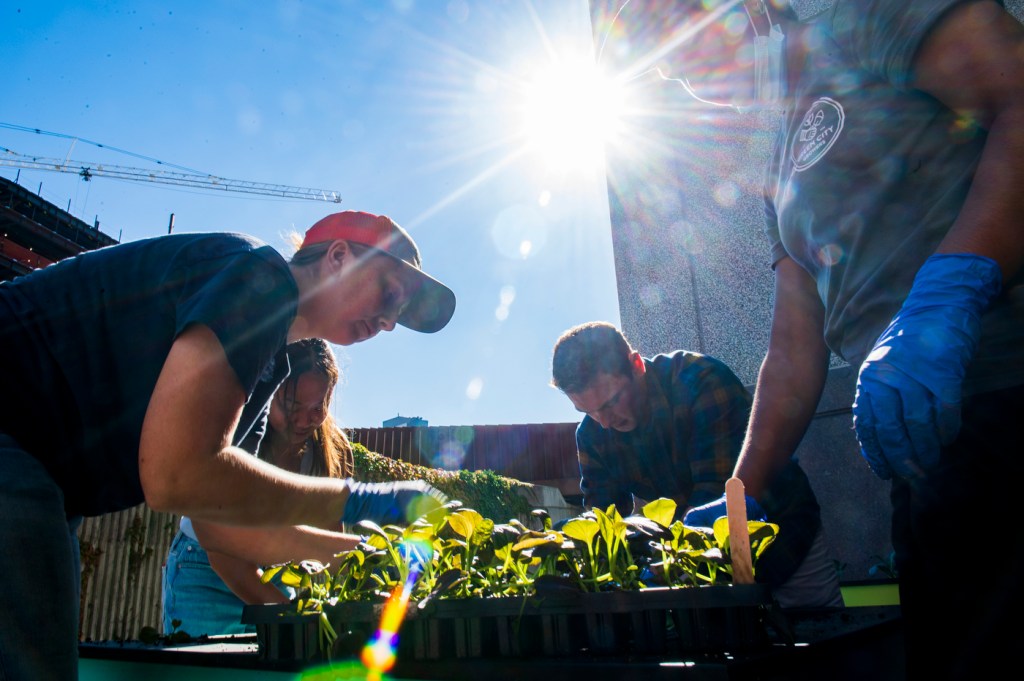New Vegetable Gardens Growing Behind Snell Library

Can’t tell the difference between cabbage and kale, but would like to learn?
All students regardless of gardening know-how are welcome to tend a newly built vegetable garden in the heart of the Boston campus. It’s located in a sunny nook behind Snell Library and has peas, oats, and a variety of fiber-rich leafy greens sprouting in time for autumn.
The impetus for the urban oasis sprang from a desire to promote awareness of sustainable, local food production, coupled with increasing student demand for growing space, says Stephen Schneider, the university’s chief arborist.
It is also an opportunity to bring together students who share a love of gardening but come from a wide variety of educational disciplines. Students don’t have to be biology majors to get involved; the point is for them to mix and mingle with various majors.
“Without the garden, these folks might never have crossed paths,” Schneider adds.


There are 15 irrigated growing boxes measuring 4 feet long by 4 feet wide featuring an assortment of greens, including bok choy, arugula, and spinach.
“Those are the things that you would grow at the beginning of the season when it’s chilly out, and they can grow at the end of the season as the temperatures begin to fall,” Schneider adds. “They’re quite hardy.”
Hardy, yes, but they’re not impervious to Boston’s brutal winters, so one of two things will likely have to happen―harvest whatever has grown and call it a year, or install plastic sheeting to see if it will keep the cold at bay. Both options are being considered.
Anticipation of frigid temperatures is why the garden boxes were built two feet above the ground, rather than putting plants directly in terra firma. Only one foot of that two-foot elevation is actually soil, thus allowing the warmer spring temperatures to circulate around the winter-hardened dirt.
“So the soil will warm up faster and you can actually plant earlier,” Schneider says.

Peas and oats in two boxes will serve as cover crops, taking nitrogen from the air and sending it down into the soil―free fertilizer. The crops will die over the winter, but their nutrients will remain in the dirt. “It’s a nice way to keep the soil food cycle moving forward,” he adds.
Another benefit to using raised beds is the quality of the soil. The dark, moist, rich dirt, trucked in by a local gardening company, is healthier and has almost no pollutants compared to urban soil.
Looking ahead, what veggies may be on tap for the spring? That will ultimately be up to students to decide when they take over the day-to-day operations, which suits Evan Fear, a third-year biochemistry major, just fine. He is the de facto head of the newly formed garden club and a goalie on the men’s ice hockey team.
“As a student-athlete, I became more aware about nutrition, and I realized that later in life I want to be able to grow my own food and manage my own nutrition,” he says.




Interest in the club is running high―it has about 40 members, and more students are inquiring about joining. Formal university approval of the club is about a year away, and Fear is managing the application process.
With his dream of campus gardening plots now a reality, Fear’s ambitions don’t end there.
“One of the dreams that I have for this is if it does reach a point where there’s a large level of produce being harvested, it would be great to do a small farmer’s market on campus. That would be another great way to connect people.”
For media inquiries, please contact media@northeastern.edu.





